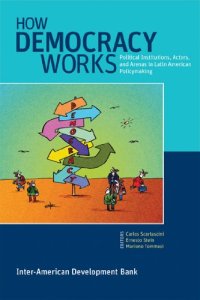
Ebook: How Democracy Works: Political Institutions, Actors, and Arenas in Latin American Policymaking (Interamerican Development Bank)
- Genre: Other Social Sciences // Politics
- Year: 2010
- Publisher: David Rockefeller Center for Latin American Studies
- Language: English
- pdf
Over the past 30 years, democratic freedoms and competitive electoral processes have taken hold as never before in Latin America. How Democracy Works takes a detailed look, from an institutional perspective, at each of the main actors on the policymaking stage in Latin America, emphasizing the extent to which institutions facilitate or hinder intertemporal political cooperation and compromise. It analyzes official political actors and arenas, as well as a number of societal actors, and explores the (formal) roles of these players, their incentives, capabilities, and the way in which they actually engage in the policymaking game. The conclusion: these political institutions and actors matter for policymaking in Latin America and leave an indelible imprint on the policy process and the resulting policies. * * * Scartascini, Stein, and Tommasi have assembled an all-star team of scholars, and the result is the most comprehensive evaluation to date of political institutions and political economy in Latin America. John Carey, John Wentworth Professor in the Social Sciences, Department of Government, Dartmouth College How Democracy Works provides a road map to understand the role of various policymaking actors in Latin America and the impact of their interaction on the quality of public policy. It is a must read for any social scientist interested in policymaking in Latin America. Pablo Spiller, Jeffrey A. Jacobs Distinguished Professor of Business and Technology, University of California, Berkeley A book that compares Latin American countries by the attributes of their democracies instead of by country has been sorely lacking. Not only does Scartascini, Stein, and Tommasi provide this perspective, it does so exceedingly well. A particular strength of the book is the integration of both institutions and actors in one common framework--the first set of chapters discuss core institutions such as the legislature, courts, and the bureaucracy, while later chapters examine key players such as regional governors, business, labor, and the press. This combination provides a more complete, and more nuanced, view of how and why Latin American democracies produce (or fail to produce) policy than any other comparative book on the market. Mark Hallerberg, Professor of Public Management and Political Economy, Hertie School of Governance, Berlin, Germany
Download the book How Democracy Works: Political Institutions, Actors, and Arenas in Latin American Policymaking (Interamerican Development Bank) for free or read online
Continue reading on any device:

Last viewed books
Related books
{related-news}
Comments (0)